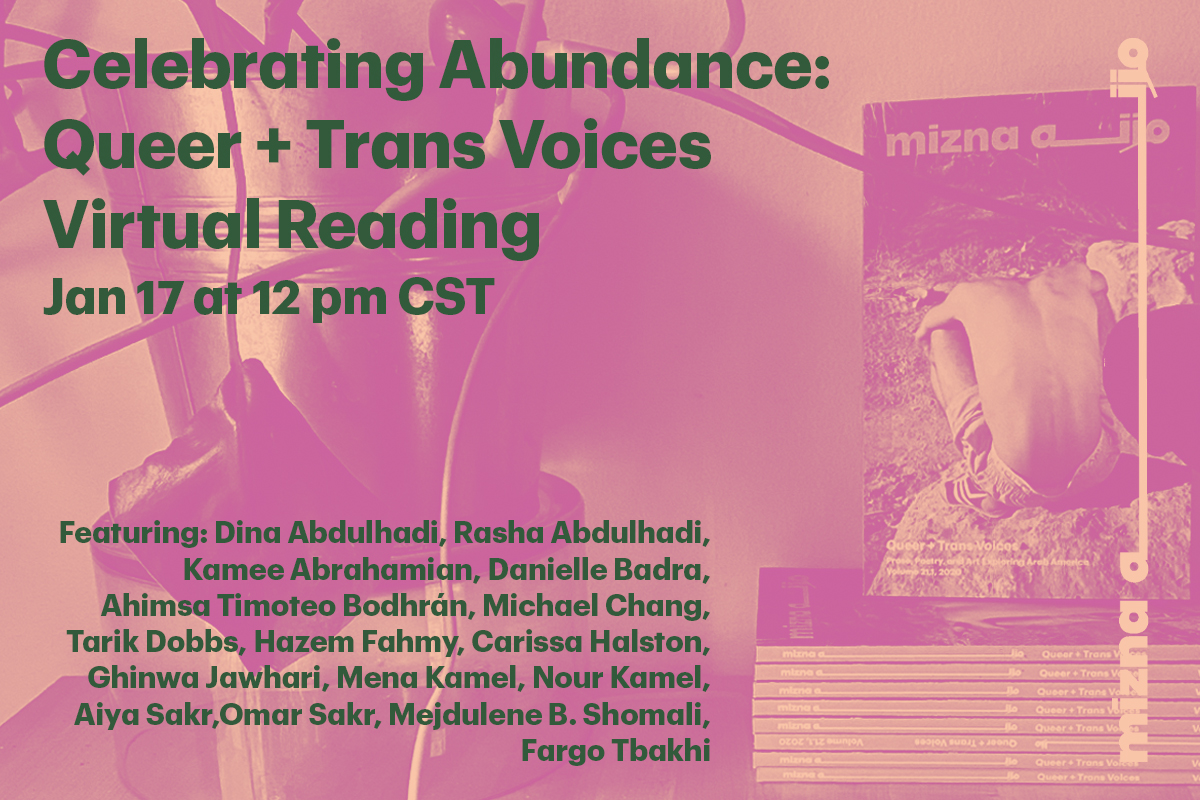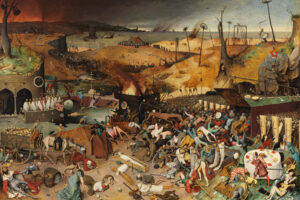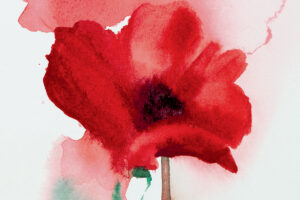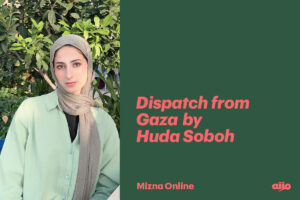
January 7, 2021
Celebrating Abundance: Queer + Trans Voices Virtual Reading
On January 17th, we’re celebrating our most recent issue Mizna: Queer + Trans Voices in abundance! This virtual reading features SIXTEEN AUTHORS, Dina Abdulhadi, Rasha Abdulhadi, Kamee Abrahamian, Danielle Badra, Ahimsa Timoteo Bodhrán, Michael Chang, Tarik Dobbs, Hazem Fahmy, Carissa Halston, Ghinwa Jawhari, Mena Kamel, Nour Kamel, Aiya Sakr, Omar Sakr, Mejdulene B. Shomali, and Fargo Tbakhi, whose works are published in the issue.
WATCH THE RECORDED READING
When: January 17, 12–2pm CST
Where: Zoom (RSVP required) + Facebook
>>HOW TO PARTICIPATE<<
RSVP HERE: http://bit.ly/2MYVsfy
The Zoom link will be sent out through Eventbrite the day before + day of the reading. In addition to the Zoom, this event will be livestreamed on Facebook.
>>ACCESSIBILITY<<
This reading will be live-captioned in English, and the full program will be available for viewing post-event.
About Mizna: Queer + Trans Voices
The summer 2020 issue of Mizna is guest edited by Zeyn Joukhadar and speaks to bodily autonomy, embodiment, and self-determination within a queer, transgender, SWANA, and Muslim lens. Mizna: Queer + Trans Voices bears witness to our rich history, and imagines futures for ourselves. Within these pages, we not only exist, and are loved, and are beautiful; we create magic. We turn our eyes toward worlds of our own making.
Read Zeyn’s foreword to the issue here: Worlds of Our Own Making.
About the Authors

Dina Abdulhadi is a writer and ex-scientist from the US South. She currently lives in New York City and works for the Alliance for Young Artists & Writers.

Rasha Abdulhadi is a queer Palestinian Southerner who grew up between Damascus, Syria and rural Georgia and cut their teeth organizing on the southsides of Chicago and Atlanta. Their work is anthologized in Unfettered Hexes, Halal if You Hear Me, Super Stoked, and Luminescent Threads: Connections to Octavia Butler. Rasha is a member of Justice for Muslims Collective, the Radius of Arab American Writers, and Alternate ROOTS. They edit fiction at Strange Horizons.

Kamee Abrahamian grew up in an immigrant suburb of Toronto and was born into an Armenian family displaced from the SWANA region. They arrive in the world today as a supreme hyphenate, queer-feminist caregiver and an interdisciplinary creative-writer-curator-performer-producer-facilitator. They have a BFA/BA in film and political science (Concordia University), an MA in expressive art therapy (European Graduate Institute), and a PhD (ABD) in community, liberation, indigenous and eco psychologies (Pacifica Graduate Institute). Their work is steeped with relational, generative, visionary and liberatory practices oriented towards ancestral reclamation and diasporic futurism. Kamee has published both literary and academic work and has organized and presented art, films, staged performances and workshops internationally. Kamee continues working freelance and collaboratively through Kalik Arts, and is the arts & creative expression lead at international feminist organization AWID.

Danielle Badra received her BA in Creative Writing from Kalamazoo College (2008) and her MFA in Poetry from George Mason University (2017). Her poems have appeared in Mizna, Cincinnati Review, The Greensboro Review, Bad Pony, Rabbit Catastrophe, Duende, Split This Rock, and Beltway Poetry Quarterly. She is the winner of the 2021 Etel Adnan Poetry Prize through the University of Arkansas Press where her debut collection, Like We Still Speak, will be published in the fall of 2021.

Ahimsa Timoteo Bodhrán is author of Archipiélagos; Antes y después del Bronx: Lenapehoking; and South Bronx Breathing Lessons. An NEA and Tulsa Artist Fellow, he is editor of the international queer Indigenous issue of Yellow Medicine Review: A Journal ofIndigenous Literature, Art, and Thought; and co-editor of the Native issue of Movement Research Performance Journal.

A Lambda Literary fellow, Michael Chang (they/them) was awarded the Kundiman Scholarship at the Miami Writers Institute. A finalist in contests at the Iowa Review, BOMB, NightBlock,& many others, their poems have been nominated for Best of the Net & the Pushcart Prize. Their full-length collection is forthcoming from Really Serious Literature. Other projects will soon be announced.

Tarik Dobbs is an Arab American, queer writer born in Dearborn, MI. Dobbs’s poems appear soon/now in AGNI, American Poetry Review, & American Journal of Poetry. Dobbs is winner of the 2nd Place 2020 Palette Poetry Spotlight Award. Their poetry chapbook, DANCING ON THE TARMAC, selected by G. Calvocoressi, is forthcoming from Yemassee Journal at U of SC.

Hazem Fahmy is a Pushcart-nominated writer and critic from Cairo. He is currently pursuing his MA in Middle Eastern Studies and Film Studies fromthe University of Texas at Austin. His debut chapbook, Red//Jild//Prayer won the 2017 Diode Editions Contest. A Kundiman and Watering Hole Fellow, his poetry has appeared, or is forthcoming in Apogee, AAWW, The Boston Review and The Offing. His performances have been featured on Button Poetry and Write About Now. He is a reader for The Shade Journal, a contributing writer for Film Inquiry and writes a monthly column on Egyptian horror cinema for Nightmare on Film Street.

Carissa Halston is a fiction writer. Her work has appeared most recently in The Normal School, The Massachusetts Review, and Willow Springs.

Ghinwa Jawhari is a Lebanese-American writer based in Brooklyn, NY. Her debut chapbook “BINT” was selected by Aria Aber as winner of the Own Voices Chapbook Prize, and is forthcoming in March 2021 from Radix Media. Her work appears or is forthcoming in The Adroit Journal, Mizna, The Bangalore Review, and others.
Mena Kamel is a writer and artist from the Mojave Desert. His work explores queer identity, sex, mainstream language, violence, and the notion of home. He’s the founding editor of Coptic Queer Stories, an online zine covering gender, sexuality, race, and religion that aims to record the experiences of Coptic LGBTQ+ individuals in the diaspora. His work attempts to challenge the status quo as it relates to customs, home, family, love, atheism, secularism, spiritual ritual, and folklore.

Nour Kamel (she/they) is perfectly lit and writes/edits things in Egypt. Kamel writes about identity, language, sexuality, queerness, gender, oppression, femininity, trauma, family, lineage, globalisation, loss and food. Their chapbook Noon is part of the New-Generation African Poets series and their writing appears or is forthcoming in Asameena, Anomaly, Rusted Radishes, Khabar Keslan, Sukoon, Closet Cases (Et Alia Press, 2020), Voicemail Poems, Ikhtyar, 20.35 Africa, Sumou and Mizna: Queer + Trans Voices (2020).

Aiya Sakr was born in the United States but grew up in Amman, Jordan, with Palestinian, Egyptian, and Jordanian heritage. She is the author of Her Bones Catch the Sun (The Poet’s Haven, 2018). A Pushcart Prize nominee, her poems have appeared in Mizna, Nimrod, and elsewhere. She has a master’s degree in literature and writing from Utah State University. Currently, she’s completing an MFA in poetry at Purdue University.

Omar Sakr is an award-winning poet born and raised in Western Sydney to Lebanese and Turkish Muslim migrants. He is the author of These Wild Houses (Cordite Books, 2017), which was shortlisted for the Judith Wright Calanthe Award and the Kenneth Slessor Prize for Poetry, as well as The Lost Arabs (University of Queensland Press, 2019), which won the 2020 Prime Minister’s Literary Award. He is the first Arab-Australian Muslim to win this prestigious award. The Lost Arabs was also shortlisted for the Judith Wright Calanthe Award, the John Bray Poetry Award, the NSW Premier’s Multicultural Literary Award, and the Colin Roderick Award; it has been released in the US and worldwide through Andrews McMeel Universal. In 2019, Omar was the recipient of the Edward Stanley Award for Poetry, and in 2020, the Woollahra Digital Literary Award for Poetry.

Mejdulene B. Shomali is a Palestinian poet and Assistant Professor of Gender, Women’s, and Sexuality Studies at the University of Maryland, Baltimore County. Her poems can be read or are forthcoming in Copper Nickel, Cosmonauts Avenue, The Shade Journal, Tinderbox, Diode Press, The Pinch Journal, and Mizna, among others.

Fargo Tbakhi (he/him) is a queer Palestinian-American performance artist. A Pushcart and Best of the Net nominee, he is the recipient of the Ghassan Kanafani Resistance Arts Prize and a Tin House Summer Workshop alum. His writing can be found in Apex Magazine, Strange Horizons, Mizna, Peach Mag, the Shallow Ends, and elsewhere. He is a Halcyon Arts Lab Fellow and works at Mosaic Theater.












